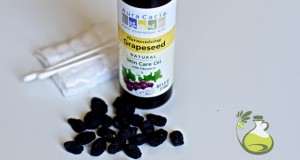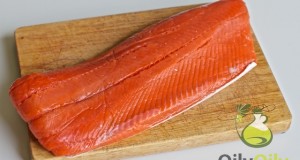
Photo credit: wikimedia
What to choose between corn oil vs peanut oil? Both oils are popular in the United States and widely used for cooking. We know that these oils are healthy and recommended for usage instead of butter or margarine. Is there any difference for our health between these oils? We’ll find out benefits and dangers of corn oil vs peanut oil.
Basics
Corn oil is derived from corn kernels. The oil is refined and deodorized. The smell and taste of corn oil is neutral, a bit sweetish. The oil is light in color. Peanut oil is made from peanuts. There are several varieties of peanut oil: unrefined oil and refined oil, cold-pressed oil and chemically-pressed. Americans prefer refined peanut oil, so we’ll compare this variety of popular in the States corn oil. The taste of refined peanut oil is mild, it has a light texture and light color as the majority of refined oils.
SEE ALSO: Corn Oil vs Sunflower Oil: Can We Interchange Them
Smoke point
The smoke point of peanut oil is 437°F according to Wikipedia. It is high enough and the oil is used for all types of frying, baking as well as for sauces and salad dressings. Corn oil has a smoke point of 450°F. It is even higher so the risk of overheating corn oil is smaller. This oil is ideal for high-heat cooking, that’s why it is used in for cooking fried chicken and French fries in fast food restaurants.
Fatty acid composition of corn oil vs peanut oil
The fat profile is one the most important characteristics of our oils. As you see from the table below peanut oil possesses a high percentage of saturated fats. Saturated fats are considered unhealthy for our heart and should be avoided. The amount of saturated fats in corn oil is lower. Peanut oil is rich in monounsaturated fats with widely-known health benefits. They help maintain the heart system functioning, lower high blood pressure, contribute to blood thinning. Corn oil in its turn also has health benefits as it is a rich source of polyunsaturated fatty acids necessary for the brain functioning, bone health and good metabolism. The drawback of these oils is that they are poor in omega-3 fatty acids. When we consume corn oil and peanut oil we don’t receive anti-inflammatory omega-3s vital for our health. The oils should be combined with products rich in omega-3 fatty acids.
| Corn oil | Peanut oil | |
| 100 g | 100 g | |
| Calories | 884 kcal | 884 kcal |
| Monounsaturated fat | 27.6 g | 46.2 g |
| Omega-6 fat | 53.5 g | 32 g |
| Omega-3 fat | 1.2 g | - |
| Saturated fat | 13 g | 17 g |
| Fiber | 0g | 0g |
| Sugars | 0g | 0g |
| Protein | 0g | 0g |
YOU MAY ALSO LIKE: What is the Difference between Corn Syrup vs Corn Oil?
Allergy
Peanut oil can be allergic to those with the allergy to peanuts. As Wikipedia states refined peanut oil is considered safe for peanut-allergic people as allergens are removed from it. Cold-pressed oil, a healthier variant of peanut oil, is dangerous for allergy-prone individuals. Some people admit that they experience an allergy reaction to refined peanut oil as well. Always take a test before consuming peanut oil. Corn oil can be allergic, but the allergy to corn oil is less widespread.
 Oilypedia.com – Benefits And Uses Of Supplemental and Essential Oils
Oilypedia.com – Benefits And Uses Of Supplemental and Essential Oils 


